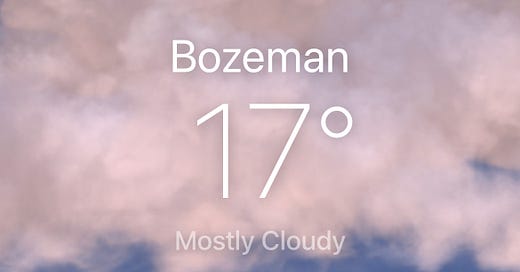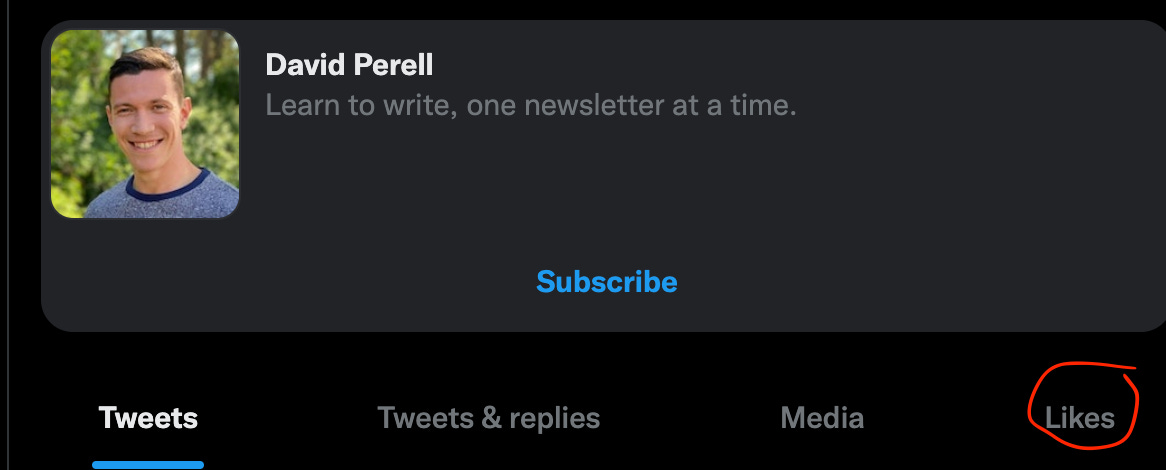Whose Mountain #6
Why mysticism may be the key to solving some of our toughest challenges, plus accountability partners and making Twitter interesting
Dear Reader,
Happy Wednesday and Merry almost Christmas. I love this time of year, even as it creeps up on me every time. This week we’re supposed to get an extreme cold spell.
Yikes! I’ll be preparing to stay inside for the rest of this week. I hope everyone reading this is staying warm.
I have a hypothesis. The reason we can’t seem to make progress on our toughest challenges is that we’ve lost interest in the mystical.
What if the reason we haven’t figured out how to solve the climate crisis is because we’re too focused on the science? What if the reason our mental health is worse than ever is because we no longer tell hero myths? And what if the reason scientific progress is slowing down is that we’re too focused on our intellects and not enough on the spiritual “soul” of what we study?
Probably not what you were expecting when you opened up today’s newsletter. At least not from me, a lost soul who grew up on Rancid and Bad Religion rather than hymnals.
So why the change? Why am I suddenly interested in the woo-woo aspects of a lot of different things? And why do I think they matter right now? Well, in this case, it comes from the science of complexity. And it may just hold the answer to how we can create personal meaning and a better tomorrow.
In this week’s newsletter
🧘Why mysticism may be the key to solving our toughest challenges
🐥I finally figured out how to make Twitter interesting
⚯ The benefits of an accountability partner
🧘Why mysticism may be the key to solving our toughest challenges
If anyone around me had mentioned mysticism or the spirit world to me a year ago, I would have either rolled my eyes or walked away. I knew, confidently knew, that the realm of religious students no longer mattered when I could think my way into any solution. Reason was the Hors D'oeuvre to the meal of logic which provided all the sustenance I was sure I needed. I ventured into meditation for increased performance and psychedelics for increased creativity.
On the rare instances when I left my head for my body, I felt a discomfort in my gut or the back of my skull (my spidey sense) that I might be missing something. I’m only now catching those signals, even as they’ve permeated my varied interests. I think what’s missing is a relationship with awe – a willingness to engage with the woo-woo in life.
You still won’t find me in a monastery or temple. I still believe firmly in the philosophy of science and the practical, natural world. But those rare stories who have ascended the dictums of religion and found a mystical connection call to me. And I can’t not listen.
In
, Brett Andersen seeks to reconcile science and religion in order to provide a framework for how we can find meaning in our world. I think he may have illuminated the path to solving our hardest problems. And I think you need to know about it.I’m going to try not to overwhelm you as I summarize an already long essay. However, the cliffs notes version looks like this:
The science of complexity shows that complexity always increases. Look at natural selection, the increase in human brain size, and the increasing complexity of our civilizations.
It also shows that the catalyst for increasing complexity can only happen at the border between order and chaos.
That border is the optimal tradeoff between efficiency and resilience. It’s where our brains operate optimally and computational capability is maximized.
Getting to this state requires a painful process of sacrifice to change our behavior. This is the theme of all major hero myths, or what Jordan Peterson calls meta-mythology
When we find that border, we kick off a process of creating a new world. This process is personified as God.
Our society has moved too far towards efficiency. We’ve seen the negatives of this optimization in the looming crimate crisis, the physical and mental health crises, the education crisis, etc.
By exploring the mystical (an experience of direct union with ultimate reality or God), we can build the capacity to return to the border between order and chaos, which is the only place we can hope to create a better shared future.
Whew! Even that was a lot. While I love a great framework, I also want to have something practical to grab onto. So here are my big takeaways:
We as humans matter. Our actions matter in the grand scheme of the universe. Not just because a religious teacher tells me so, but the science of complexity agrees.
If we’re going to come up with what my friend
calls leap-frog solutions for our current challenges, we need to build up the capacity to change ourselves through the process of creative destruction (increasing complexity). We build up that capacity by finding people to emulate who willingly do just that. In other words: READ MYTHOLOGY. SEE YOURSELF IN IT.I’m going to explore the mystical in my life. As someone who didn’t grow up religious, I’m intimidated even writing this. But as Jordan Peterson shows, engaging in creation is the optimal goal of life, and the way to do that is through the mystical. So here we go. If you have thoughts on how, let’s talk.
I’m interested in reading more from Alan North Whitehead. Who else should I read?
Look for ways I can build more resiliency, especially by trading off efficiency.
Lean into tension. Seek it out. Complexity increases by “opponent processing relationships.” Basically, holding two opposites at the same time. Efficiency vs. resiliency, sympathetic and parasympathetic system, etc. These opposites work together to achieve the optimal point for increasing complexity. How can I create these relationships in my life if I want to help solve the problems of our age?
Oh, and just for fun, it seems that the language of the bible is increasing, and has been since the 1980s, while the language of capitalism has been declining. Maybe we’ve already caught on, even though we didn’t know it.
🐥 I finally figured out how to make Twitter interesting
I have a confession to make. Are you ready?
I hated Twitter. I mean, I hated most social media for years. The privacy issues were too much for me when I was in the military, and the mental health issues and hedonic treadmill kept me away after. I finally gave in and started using Twitter as part of Write of Passage, but I couldn’t figure out how to make it interesting.
Two people changed that for me:
Dickie Bush had a great thread on how to use Twitter. The lists have become my go to way to use Twitter.

David Perrell recommended finding people you resonate with and looking at what content they like. This can be a great hack to find other people to follow.
Now my experience is much more interesting. A lot of my feed is still people who I find interesting, but I finally have a way to find the intellectual ideas and the somatic advice that I’ve been looking for. Maybe I’m starting to find my tribe.
⚯ My 2023 focus system: accountability partners
2022 was the first year I stepped out of traditional employment, looking for something better. I’ve started writing online, started a company, suffered from insomnia, met amazing friends, and faced some of the biggest challenges of my life. Going into the end of the year, I feel like I’ve lost focus at times. Do you ever feel the same?
My coach and I came up with a simple solution: an accountability partner. Every Monday, I send him an email.
My Top 3 priorities for the week
Did I achieve last week’s priorities?
If not, what are my excuses?
There’s a lot to having accountability partners. A recent study by the Association for Talent Development found that you have the following probability of completing a goal with these actions.
Having an idea or goal: 10% likely to complete the goal
Consciously deciding that you will do it: 25%
Deciding when you will do it: 40%
Planning how to do it: 50%
Committing to someone that you will do it: 65%
Having a specific accountability appointment with someone you’ve committed to: 95%
That means you only have a 5% chance of missing a goal if you have an accountability appointment,ent.
How can you create accountability appointments?
Thanks for reading.
What do you think? What resonated in this week’s edition? I’d love to hear from you.
Until next week, have an intentionally wonderful week.
Latham








Silvio at The Semi-Serious View spoke this week in his article about idleness being essential to the mystical process you describe. He talked about the practice involved with being able to be "naturally idle." It's kind of funny, thought, the idea of figuring out, valuing, practicing, or getting a handle on idleness. The meditation movement has veered in this direction citing the enormous list of benefits that come with engaging meditation. The mysticism you describe seems to be that very force that defies any type of pursuit. It's the least expected chaotic yet divine intervention that always shows up from an unexpected, unplanned, and uncontrollable direction. Perhaps that's why so many spiritual traditions speak of faith and surrender as key moods in the process of staying human and porous to uncaused inspiration.
Ah it's much colder on your side of the mountains for this cold snap! Still -10ºF here is pretty rough...
Looking forward to seeing where your mystical journey will take you and hope you'll share more bits with all of us.